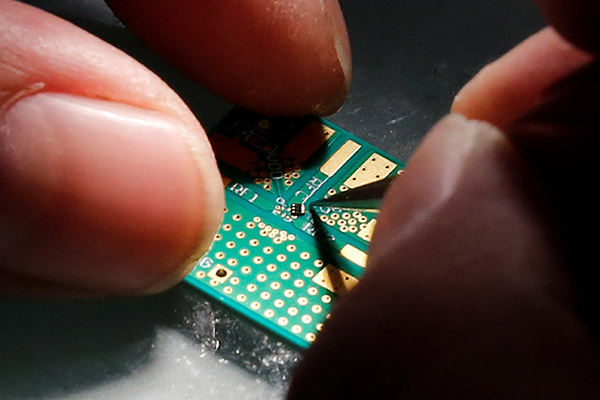
Beijing-based chip company Tsinghua Unigroup Ltd signed deals on Tuesday that would grant it up to 150 billion yuan ($21.8 billion) in financing, enabling it to champion the country’s efforts to develop homegrown chips.
The deals are expected to give the State-owned technology group enough cash to fulfill its grand ambitions in the semiconductor sector, as it makes haste to join the ranks of global giants such as Intel Corp, Qualcomm Inc and Samsung Electronics Co.
China Development Bank agreed to provide financing of up to 100 billion yuan from 2016 to 2020, Tsinghua Unigroup said on its official website.
China’s Integrated Circuit Industry Investment Fund will invest up to 50 billion yuan in the company to help it grow its presence in the market, which creates key parts for smartphones, PCs, servers and other electronic products.
The company said it will use the new capital to upgrade its research and development, and to scale up its operations.
Tsinghua Unigroup, an affiliate of China’s prestigious Tsinghua University, has been aggressively growing its semiconductor empire through partnerships and acquisitions.
It became China’s largest mobile chipmaker, after it bought Spreadtrum Communications and RDA Microelectronics Inc three years ago.
The company is now working on a $30 billion domestic memory-chip production complex in Nanjing, Jiangsu province that will become China’s largest when completed.
The intensified efforts to boost its chip-related resources come as China seeks to reduce its reliance on imported technology, amid concerns related to national security.
Roger Sheng, a senior analyst at research firm Gartner Inc, said after an investment and shopping spree in the past three years, Tsinghua Unigroup is now focusing on integrating its newly acquired resources.
“The promised capital support is in line with the amount of money Tsinghua Unigroup needs to carry on its announced plans. Due to the government’s strong support, both public and private capital is flooding into the integrated circuit sector,” he added.


